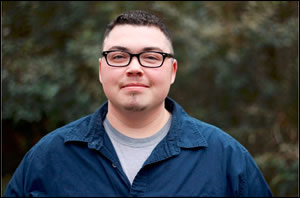News & Commentary
Aug 10, 2016
Supreme Court Grants “Emergency” Stay to Stop High School Student from Using Boys’ Bathroom
By Gail Deady The Secular Society Women’s Rights Legal Fellow Note: This article was originally posted on the blog of the American Constitution Society for Law and Policy.
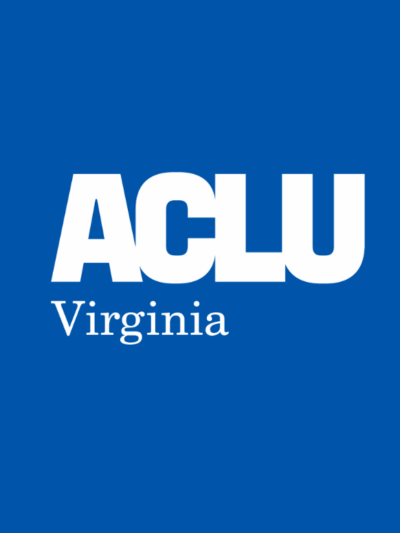
Apr 26, 2016
Virginia’s Bathroom Case to Have Broad Implications
Note: The following was originally posted on the blog of the American Constitution Society on April 26, 2016.By Gail Deady The Secular Society Women’s Rights Legal FellowGavin Grimm is a junior in high school in Gloucester, Virginia. Gavin is a boy but, because he is also transgender, his school district prohibits him from using the boys’ restrooms. He is instead forced to use the girls’ restroom or single-user, gender-neutral restrooms. With the help of the ACLU of Virginia and the ACLU LGBT & AIDS Project, Gavin challenged this policy in federal court as discriminatory. In a landmark decision last week, the United States Court of Appeals for the Fourth Circuit agreed with him.Under Title IX of the Education Amendments of 1972, educational institutions receiving federal education funds are prohibited from discriminating against students on the basis of sex. There are some exceptions to that general prohibition, such as a regulation allowing schools to designate separate restrooms for male and female students.In April 2014, however, the Department of Education issued guidance stating that if schools treat male and female students differently, they must treat transgender students consistently with their gender identity.Gavin came out to his family as a transgender boy in the summer of 2014 and began his transition, which meant living all aspects of his life as a boy. That fall, Gavin enrolled in school as a male student with his new legal name: Gavin. Unsure of how his peers would react to his transition, Gavin initially asked to use the nurse’s restroom.At first, everything went well. School staff supported Gavin’s transition, and most of his peers accepted him as just another male student. When it became clear to Gavin that he could safely use the boys’ restrooms, he asked for and received school administrators’ permission to do so. Gavin used the boys’ restrooms without any problems for about seven weeks.Some parents nevertheless objected to the school’s decision to allow a transgender boy to use the same school restrooms as every other boy. At a November 2014 School Board meeting, adults spoke out against Gavin based on misinformation and unfounded fears about transgender people. Gavin also spoke at the meeting, saying he just wanted to use the restroom in peace.Despite warnings that the policy violated Title IX, the School Board voted in December 2014 to implement a policy requiring students to use restrooms consistent with their “biological gender” and directing students with “gender identity issues” to use single-stall, gender-neutral restrooms. The School Board claimed this policy was necessary to protect the privacy and safety of all students. But what it really did was stigmatize transgender students and imply they are unfit to use the same restrooms as their peers.With the help of the ACLU, Gavin challenged this policy as discriminatory on the basis of sex under Title IX and the Equal Protection Clause of the Fourteenth Amendment. He also filed for a preliminary injunction to use the boys’ restroom while litigation was pending. The United States filed a statement of interest supporting Gavin’s Title IX claim.In September 2015, the district court issued an opinion granting the School Board’s Motion to Dismiss Gavin’s Title IX claim and denying his request for a preliminary injunction. The court’s decision refused to give deference to the Department of Education’s interpretation of its regulation permitting schools to have sex-segregated restrooms. Further, it found that discriminating against a student because he is transgender did not constitute sex discrimination under Title IX.We appealed that decision to the United States Court of Appeals for the Fourth Circuit, and several groups filed amicus briefs supporting Gavin’s case. One brief, filed in support of Gavin on behalf of school administrators from across the country, provided strong evidence that the School Board’s fears – that allowing transgender students to use gender identity-appropriate restrooms in school would lead to coed bathrooms, violate students’ privacy or lead to male students pretending to be transgender to gain access to girls’ restrooms or locker rooms for nefarious purposes – had not materialized in other school districts with transgender-inclusive restroom and locker room policies.Last week, the Fourth Circuit agreed with Gavin. In a 2-1 decision, the panel held that schools that bar transgender students from using the restrooms matching their gender identity discriminate on the basis of sex in violation of Title IX. The court sent the case back to the trial judge for further proceedings on the preliminary injunction. On April 21, the School Board unanimously voted to seek en banc review.The Fourth Circuit’s ruling has widespread implications. It is the first federal appeals court to rule on the question of whether Title IX bars bathroom policies that discriminate against transgender students, and it backs up the federal Department of Education’s interpretation of Title IX. It also directly applies to North Carolina’s recently enacted law, HB2, which forces transgender students to use the wrong restroom at school. The ACLU of North Carolina was among several plaintiffs that filed a federal lawsuit earlier this month to overturn HB2 on constitutional grounds, and because it would force schools to violate Title IX. The ruling also sends a strong message to South Carolina, also within the Fourth Circuit, which is considering a similar law.Most importantly, the Fourth Circuit’s decision sends a strong message that forcing transgender people who are already at greatly increased risks of suicide, harassment, and violence to use the wrong restroom is sex discrimination and should not be tolerated. Neither Gavin, nor any other transgender student, should be humiliated by having his identity disrespected and undermined every time he has to use the restroom at school.
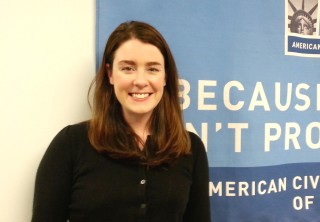
Feb 17, 2016
Granting Special Rights to Certain Beliefs: Limiting Freedom
The following op-ed was published in the Richmond Times-Dispatch on Feb. 17, 2016.Proponents of two bills still under consideration in the Virginia General Assembly — Senate Bill 41 (SB 41) and House Bill 773 (HB 773) — say they are necessary to shield religious believers from persecution or prosecution.In fact, both bills either arm some, and only some, believers with a government sword to force their beliefs on others, or accord an unconstitutional government preference to some believers.No case has been cited, no facts reported, no evidence adduced that there is any real or imminent threat to religious freedom in Virginia. No legislation is necessary to protect Christian churches and other faith communities or any religious leader from being “forced” to marry people in their faith tradition when doing so would be inconsistent with the tenets of their faith.The First Amendment and the Virginia Statute for Religious Freedom are strong walls against any such action by government. The Virginia Religious Freedom Restoration Act passed in 2007 provides additional protection against any government action that “substantially burdens” anyone’s exercise of their faith.Why then is legislation being proposed, and what would be its effect?SB 41 offers those given the privilege of “solemnizing” a marriage on behalf of the state (a civil act) the authority to discriminate among people for whom they would provide that service based on any “sincerely held religious belief.” The bill would accord this privilege to discriminate not just to faith leaders who seek the authority to solemnize civil marriages, but to every judge and any person who obtains a court order allowing them to solemnize marriages on behalf of the state.It would not “burden” anyone’s free exercise of religion to require anyone who wants the authority to solemnize marriages on behalf of the state to do so without discrimination. Faith leaders would still be able to choose freely to perform or not to perform the religious rite of marriage without any state involvement, and people married by a faith leader or in a religious tradition that chooses not to marry certain people or couples could go to a judge or other civil authority to get their marriage solemnized for purposes of state recognition.SB 41 also says any religious organization or any unspecified organization “operated in connection with a religious organization” cannot be required to provide any “services, accommodations, facilities, goods, or privileges for a purpose related to the solemnization of any marriage.” The bill doesn’t say this is related to the performance of the religious “rites” of marriage. It refers to the solemnization of the marriage civilly, which is a state action.This conflation and confusion of civil and religious marriage is purposeful. It leads to a broad grant of authority to discriminate based on religion in conducting a public function or offering services or goods related to a public function. No burden on the free exercise of anyone’s religion would exist if the right to discriminate was not authorized.HB 773 seeks to grant a special and even broader privilege to discriminate, and a private cause of action to enforce that right only to people who hold certain religious beliefs regarding same-sex marriage, premarital sex, and the definition of gender. The bill states the protections afforded this select group of believers would be “in addition to the protections provided under the United States Constitution, the Constitution of Virginia, and federal and state law.”This grant of special rights is clearly an unconstitutional establishment of religion that prefers one set of beliefs over all others.The Supreme Court of the United States has said “(t)he clearest command of the Establishment Clause is that one religious denomination cannot be officially preferred over another.” The court also has emphasized that “(t)his prohibition is absolute.” Any rule or law that purports to treat certain religious beliefs differently (and more favorably) than others must, at a minimum, be justified by a compelling governmental interest, and be closely designed to further that interest.The Virginia Constitution also expressly protects the “right to be free from any governmental discrimination upon the basis of religious conviction …”, Art. I Section 11. This also commands strict scrutiny of a statute, like this one, that creates a preferred status for certain beliefs over others.No compelling interest can be articulated to support passage of legislation creating special rights and legal causes of action only for people who have certain specified beliefs about sex and marriage. Passage of such legislation would constitute an establishment of religion. When government has a religion, we are all less free to believe.
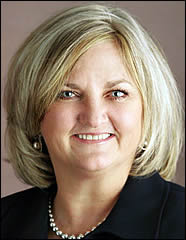
Feb 09, 2016
Do You Want Our Business or Would You Prefer We Take it Elsewhere?
Note: This is the last in a five-part series featuring Virginians whose rights would be directly affected by anti-LGBT bills now under consideration in the state legislature. All writers participated in a joint news conference held by the ACLU of Virginia and Equality Virginia at the Virginia Capitol on Jan. 19, 2016. It reflects the author’s views and not necessarily those of the ACLU of Virginia.By Philip CrosbyMy name is Philip Crosby and I have been working as a leader in Virginia’s thriving arts and culture industry for over 30 years.Recently I had the honor and the privilege to help present to Governor McAuliffe the findings of the LGBT Tourism Task Force, a group of over 20 professionals gathered from across the Commonwealth to recommend strategies to increase the number of tourists coming to Virginia and to increase the amount of money spent by tourists in the Commonwealth.Like every state and jurisdiction, our beloved Commonwealth is judged by our visitors, as well as by conference and meeting planners, tourism operators, business leaders and prospective students and scholars for its legal, social and welcoming climate. Do you want us here? Will we be treated with open arms, or with cold indifference or worse, open hatred? Do you want our business or would you prefer we take it elsewhere?Just last year, a so-called Religious Freedom Restoration Act passed by Indiana’s state legislature threatened to bring tourism in Indianapolis to a standstill, caused corporations to cancel expansion plans and forced large conferences and events to pull out of the city. Indianapolis had a major public relations debacle on its hands, one that cost it millions of dollars. No one would want to see that happen in Roanoke, in Norfolk or in Richmond.Nationwide public opinion polls tell us that the majority of Americans believe that no one should be turned away from a business based on their sexual orientation or gender identity, and yet, alarmingly, a record number of bills that would do just that – legalizing discrimination in commerce and public life – have been introduced during this session of the General Assembly.Is that what we want in Virginia? Do we want to create an atmosphere that says, “Please don’t come here, please don’t work here, please don’t spend your money here”? Not only is that a Virginia we don’t want, that is simply not a Virginia that we can afford.I urge the General Assembly to ensure that Virginia welcomes all its visitors and assures all its residents that wants them to visit here, live here, work here and spend their money here.As a matter of principle and an unshakeable commitment to promoting hospitality and tourism here, we must keep Virginia open for business for all.
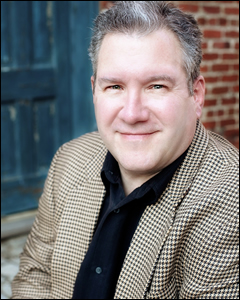
Feb 04, 2016
An Undeniable Truth: All Virginians are Created Equal
Note: This is the fourth in a five-part series featuring Virginians whose rights would be directly affected by anti-LGBT bills now under consideration in the state legislature. All writers participated in a joint news conference held by the ACLU of Virginia and Equality Virginia at the Virginia Capitol on Jan. 19, 2016. It reflects the author's views and not necessarily those of the ACLU of Virginia.By Michael Thorne-Begland Vice President for ROSMY and LGBTQ Youth OrganizationFounded in 1991 in Richmond, Virginia, ROSMY’s mission is to ensure equal opportunities for success for Virginia’s lesbian, gay, bisexual, transgender, and questioning (LGBTQ) youth through access to support, education, and advocacy. ROSMY continues to be the only organization in the area that directly addresses the unique needs and the healthy social development of LGBTQ youth ages 11-20. It offers weekly youth support meetings, sensitivity training for professionals, educational resources, youth leadership initiatives.You can find additional information about ROSMY at www.ROSMY.ORGMartin Luther King said that darkness cannot drive out darkness; only light can do that.So today we are here to shine a light on the attempts of several lawmakers to enshrine in the laws of the Commonwealth a narrow, ignorant view of what it means to be lesbian, gay, bisexual and transgender.In the past several years - truth has been on the march – in this Commonwealth and around the country. In her triumph over ignorance, truth has repeatedly shown us that all Virginians are created equal. Every lesbian girl, every gay boy, every bisexual youth and every transgender child is created equal. That simple truth, unsettling to some, will no longer be denied.The onslaught of proposals to enshrine anti-gay bias in our laws is a reaction to this simple truth and highlights the darkness that grips some Virginians – a darkness fueled by lies passionately preached by some and eagerly repeated by the small-minded.Victoria Cobb and others say Virginia’s LGBT youth are broken – ignoring the amazing lives of tens of thousands of LGBT youth in Virginia who each day show us LGBT youth are just as capable, just as successful, just as kind and human and goofy and caring and smart and driven as their peers.Theirs is a lie passionately preached by some and eagerly repeated by the small-minded.They say Virginia’s LGBT youth are predators and a threat to other youth – ignoring statistics that show LBGT youth are much more likely to be bullied than their straight and cisgender counterparts.Theirs is a lie passionately preached by some and eagerly repeated by the small-minded.They say a trans-child’s need to use a bathroom appropriate for their gender places other youth at risk – fabricating deranged scenarios where such an act – using a bathroom appropriate for your gender, creates risk for others.Theirs is a lie passionately preached by some and eagerly repeated by the small-minded.They say that laws like those proposed this year aren’t about discriminating; they are about protecting. These are the same people who said the institution of marriage would be devalued if our marriages were fully recognized. They said our military would be less effective if we allowed our LGBT soldiers to serve honestly. They say that religious freedoms will be trampled if LGBT Virginian’s enjoy the same rights as others.These are their lies, passionately preached by some and eagerly repeated by the small-minded.Truth, in the hearts and minds of Virginians and etched on the pages of our recent past, has shown Victoria Cobb and others like her for what they are. And year after year, their darkness is leaving our schools and our churches and our workplaces and our general assembly. It is leaving, but it is not gone. Their darkness will not be driving out with darkness, but with light.So today we are here to shine a light on the attempts of several lawmakers to enshrine in the laws of the Commonwealth, a narrow, ignorant view of what it means to be lesbian, gay, bisexual and transgender, and speak our simple, undeniable truth thatWe support the efforts of the ACLU of Virginia and Equality Virginia and other fair-minded Virginians who support equality for all.
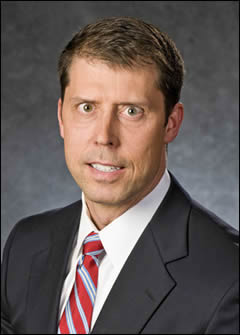
Feb 01, 2016
Gender isn't What is in Your Pants. It's What's Between Your Ears.
Note: This is the third in a five-part series featuring Virginians whose rights would be directly affected by anti-LGBT bills now under consideration in the state legislature. All writers participated in a joint news conference held by the ACLU of Virginia and Equality Virginia at the Virginia Capitol on Jan. 19, 2016. It reflects the author's views and not necessarily those of the ACLU of Virginia.By AmyI have to say, I never imagined that I would be a part of a press conference. Especially one that had anything to do with politics. Up until the last year, the type of politics I got involved with were debates between my children on who got to pick the radio station in the car.But here I am today, both proud and saddened to stand before you. Proud, because today I get to tell you about my amazing daughter. She's brave, beautiful, smart, sassy, and so very strong.Saddened, because across the street at the General Assembly, there are bills being considered that target her, try to segregate her, and potentially endanger her.Transgender rights are human rights, and today I am here to advocate for my daughter and the rights of all transgender youth like her in Virginia.This is not a trivial situation. Going to school every day is an act of courage by my daughter. There, she is required to use a separate bathroom, off of a closet. Which takes her 5 extra minutes every trip to get to, taking time away from her education.Delegate Cole's House Bills 663 and 781 seek to further alienate, segregate, and potentially criminalize our transgender youth and the transgender community as a whole. In a school setting, these bills set the stage for intolerance. It turns peers into the potty police, equiring students to complain anytime they THINK someone of the opposite gender uses their restroom.In a public setting, this puts my young daughter in danger. Her choice will be to share a restroom with men. Or use the women's restroom, where she is safe, and potentially face a fine and a visit by a police officer.Since I would never allow my daughter in the men's bathroom alone, I would have to accompany her. Then I also would be placed in a potentially dangerous situation, and faced with a fine.You see, gender isn't what is in your pants. It's what's between your ears. And anyone who saw my daughter enter a men's bathroom would be quite confused and hopefully, concerned.All over the United States, we have schools that protect, and respect a student’s gender identity. And not a single reported incident. In Virginia, we are seeing more and more schools take a stand to protect transgender youth and staff. And much of our community supports these moves!Mr. Cole's bills seeks to destroy that work and support.I want my daughter to have a successful school experience. Part of that is feeling supported, respected, valued, and safe. Her school experience should not include bathroom monitors ensuring her anatomical sex. Going to the grocery store with my children should only require my purse, my list, and if my children are with me, my patience. It should not require a copy of our birth certificates.These bathroom bills are discriminatory, and unnecessary.
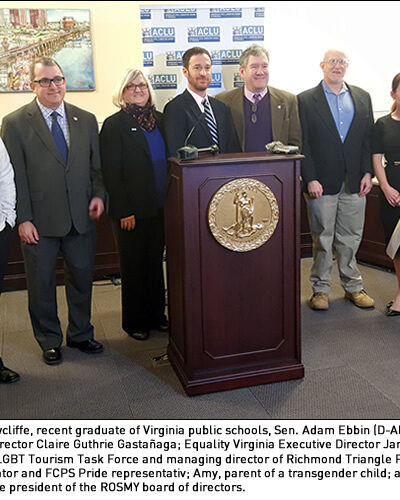
Jan 31, 2016
ACLU-VA Joins with Coalition to Fight Blatantly Discriminatory SB40
The ACLU of Virginia and three other prominent civil rights organizations have joined in a strongly-worded letter to state Sen. Mark D. Obenshain (R-Harrisonburg), chair of the Senate Courts of Justice Committee, urging opposition to Senate Bill 40."If passed, this bill would allow all clerks and deputy clerks in the commonwealth to refuse to issue a marriage license to any couple if the clerk objects to the marriage based on 'personal, ethical, moral, or religious grounds,'" according to the letter, signed by ACLU-VA Executive Director Claire Guthrie Gastañaga, Americans United for Separation of Church and State State Legislative Counsel Amrita Singh, Anti-Defamation League Associate Regional Director Eric M. Wachter, and Jewish Community Relations Counsel of Greater Washington Director of Virginia Government Relations Darcy Hirsch.The letter continues: "If this legislation is passed and signed into law, clerks would believe that they could refuse to issue marriage licenses because they do not approve of marriage for couples who are interfaith, interracial, same sex, or divorcees. Government officials—funded with taxpayer dollars—should not be allowed to pick and choose which of their duties they will fulfill or which services they will provide and to whom, especially when the result would be blatant discrimination and the service to be denied involves a fundamental human right."Fundamental reasons why SB 40, sponsored by Sen. Bill Carrico (R-Grayson) should be defeated are:
Jan 27, 2016
Gavin Grimm Statement Regarding School Sex Discrimination Lawsuit
Following is a prepared statement that Gloucester High School student Gavin Grimm delivered at a news conference today with his attorneys from the ACLU of Virginia and ACLU national. The conference was held immediately following oral arguments before the U.S. Court of Appeals for the Fourth District in Gavin's sex discrimination case against his local school board. Watch the entire news conference below."Standing at the school board meeting last year was equal parts humiliating and terrifying."Humiliating because, at age 15, I had to witness adults of my community discuss in a public forum some rather intimate details of my anatomy. In plainer words, the anatomy of a 15-year-old was considered appropriate for public conversation by the Gloucester County School Board."For any kid that would be mortifying. However for a kid who is transgender, bringing to the forefront of people’s minds the very part of themselves that already makes them dysphoric is incomparably distressing."I sat by while people repeatedly called me a girl. "She." "Her." "Young lady." "Confused young lady." Even "freak." Bullying is already an enormous problem for high school aged youth, and especially transgender youth. To hear adults of my community treat me as if I was a creature for their ridicule and observation, or some oddity on a stage was incredibly dehumanizing to an extent I could not possibly convey."And of course, I was terrified. Firstly, because the school board had the power to bar me from the correct restroom for the rest of my time at Gloucester High School. Secondly, because I was in a room full of adults who thought it appropriate to have this sort of vulgar discussion, who would clap or cheer after every derogatory statement, of which there were many."After enduring all of that – twice – I felt as though I couldn't possibly take any more hits. But I did, because at the end of the school board meetings, my school board chose to enact a policy that would further alienate and stigmatize me by forcing me to use separate restrooms from all of the other students at school. For me, the thought of going into a separate restroom which might as well have been labeled "other" was just far too much to bear. The trek to the restroom in the nurse’s office each time it was necessary was similarly humiliating, similarly upsetting and othering and dysphoria-inducing. The only difference was that it was just slightly less conspicuous."I am fighting this fight because no kid should have to think so hard about performing a basic and private function of being alive. No kid struggling to be accepted, and struggling to accept themselves, should have to simultaneously battle for the right to use the correct bathroom. That is why I have come to this point. I hope that I will be one of the last kids that has to go through something like this, and I am going to do what I can to ensure that."
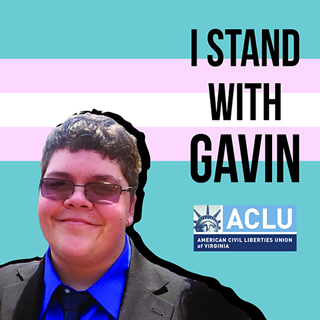
Stay Informed
Sign up to be the first to hear about how to take action.
By completing this form, I agree to receive occasional emails per the terms of the ACLU’s privacy statement.
By completing this form, I agree to receive occasional emails per the terms of the ACLU’s privacy statement.

